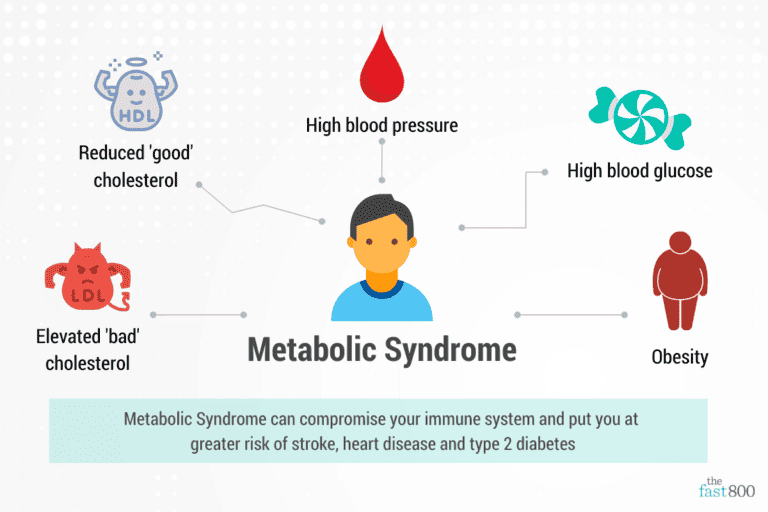Metabolic Syndrome: A Dangerous Combination
While many people discover The Fast 800 as a solution for obesity and/or elevated blood sugar, these markers of the health of your metabolism often go hand-in-hand with other presenting signs that are collectively called Metabolic Syndrome. However, it is more than just a collection of signs and symptoms – if left untreated, Metabolic Syndrome can be a slippery slope to conditions such as type 2 diabetes, heart disease and stroke.
Metabolic Syndrome is mostly a lifestyle condition, meaning it usually develops as a result of poor diet and lifestyle, often culminating in insulin resistance and blood sugars starting to creep up. However, this generally means that when better practices replace less healthy habits, Metabolic Syndrome can be successfully treated and even reversed.

How do I know if I have Metabolic Syndrome?
Metabolic Syndrome is a cluster of conditions, including high blood pressure and obesity, that occur together. It is usually associated with insulin resistance and increases your risk of getting heart disease, stroke and/or type 2 diabetes. It may be diagnosed if you have three or more of the following conditions:
High blood pressure
- If you’ve previously been diagnosed with hypertension, or
- If your systolic blood pressure (the top number) is more than 130 mm HG, or your diastolic blood pressure (the bottom number) is more than 85 mm HG, or both.
High blood pressure damages blood vessels. When those vessels are exposed to high blood pressure over time, they thicken and become less flexible, which can affect the arteries that supply blood to the heart. High blood pressure alone is not symptomatic, but it does increase the risk of heart attack, stroke and kidney failure.
High blood glucose
- If you’ve previously been diagnosed with type 2 diabetes, and/or
- Your fasting blood glucose is more than 100 mg/dL (5.6 mmol/L)
High blood glucose is caused with sugar builds up in the blood. Much like eating too much sugar and not brushing your teeth, the constant excess sugar can cause organ systems to degenerate.
Elevated ‘bad’ cholesterol
- If your blood triglycerides are more than 150 mg/dL (1.7 mmol/L), or
- You’ve previously been recommended treatment for high cholesterol
High triglyceride levels can clog arteries with fatty deposits called plaque, which makes it difficult to get much-needed oxygen-rich blood to the heart, and which can be a pre-cursor to heart attack.
Join our email community
Learn more about The Fast 800 approach to healthy living by receiving our free content, health tips and recipes as well as exclusive offers, delivered straight to your inbox.
Reduced ‘good’ cholesterol
- If your blood HDL is under 40 mg/dL (1.03 mmol/L) for men or under 50 mg/dL (1.29 mmol/L) for women, or
- You’ve previously been recommended treatment for high cholesterol
While triglycerides can cause blockages, HDL cholesterol helps to unblock blood vessels by removing deposits and therefore preventing heart attacks.
Obesity and/or excess ‘belly fat’
- If your Body Mass Index (BMI) is over 30, and
- Your waist measurement is higher than typically healthy people of your sex and ethnicity. For most men, a large waist measurement is 94cm/37in or more, but 90cm/35.5in or more for South Asian men. For most women, a large waist measurement is 80cm/31.5in or more.
Obesity promotes insulin resistance. Additionally, people who hold fat mainly around their abdomens are considered ‘apple-shaped’ and have a higher risk of many of the conditions associated with Metabolic Syndrome.
What are the dangers of Metabolic Syndrome?
While it’s not uncommon for people to have one of the above criteria, the more of these risk factors clustered together, the greater the chance of developing coronary heart disease, stroke and type 2 diabetes. Unless you do something about Metabolic Syndrome, it is likely to worsen over time and further increase your risk.
Metabolic Syndrome can also have negative impacts on the immune system function and quality of life. Having Metabolic Syndrome can even make it more difficult to lose weight – a frustrating fact when weight loss is, in fact, a fantastic treatment! Many people with Metabolic Syndrome have, as the name suggests, metabolic dysfunction that increases their sensations of hunger. The cues the body should be sending to tell you that you’re full may no longer work properly if you have Metabolic Syndrome. As a result, willpower is not a useful weight loss tool!
How you can reduce your risk factors and reverse Metabolic Syndrome
If you are obese, losing weight is hugely important in improving your risk of medical conditions associated with Metabolic Syndrome. The good news is that Metabolic Syndrome is a problem that can be solved and by doing so, your appetite will shrink and it will be easier to lose weight.

Instead of using willpower, one of the best places to start is to address insulin resistance by reducing calories and eating a moderately low carb Mediterranean-style diet. We know nutrients like fibre, protein and healthy fats are at the heart of a heart-healthy diet.
Practising intermittent fasting or time-restricted eating (TRE) is also a proven way to improve insulin sensitivity and encourage the body to burn fat, leading to weight loss. Combining TRE or fasting with a lower-carb Mediterranean-style diet, like The Fast 800’s approaches, is a great scientifically-backed strategy to turn Metabolic Syndrome around.
Exercise is also an important component. When you overeat and do too little exercise, fat builds up inside your muscles, which causes problems. By increasing your activity levels alongside improving your diet, when your blood sugar levels do rise (which is normal whenever you eat), your muscles are much more efficient at mopping it up and turning it into energy before it can cause problems. By moving more, you’ll be improving blood sugar levels, reversing insulin resistance, reducing pre-diabetes and even type 2 diabetes. By doing this you will help defeat Metabolic Syndrome. If you’re not sure where to start, try our free 7-day at-home exercise plan.
In short:
- Metabolic Syndrome often stems from insulin resistance and is the term for a cluster of risk factors presenting in one person.
- Metabolic Syndrome is when a person has three or more of the following: obesity, high blood glucose, high blood pressure, high triglycerides and low HDL cholesterol.
- Metabolic Syndrome puts you at greater risk of stroke, heart disease and type 2 diabetes.
- Metabolic Syndrome can be managed and reversed by practising fasting alongside a lower-carb, Mediterranean-style diet and increasing exercise and activity levels.









